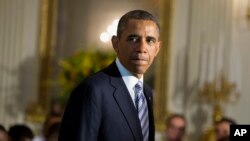Amid international support and criticism, the United States is proceeding with a plan to arm Syrian rebels after finding what officials say is evidence the Syrian government has used chemical weapons during the nation's civil war.
The White House has reiterated President Barack Obama's view that chemical weapons, including nerve gas, crosses a "red line" and necessitates more U.S. involvement in the war.
The two-year conflict has cost Syria more than 90,000 lives, though U.N. Secretary-General Ban Ki-moon said Friday there are indications the actual death toll could be "well above that."
U.S. allies in Europe have so far reacted supportively to the chemical weapons assessment.
But Syria's Foreign Ministry said Friday the U.S. accusation - stemming from an intelligence report - was based on "fabricated information" and dismissed the claim as "lies."
Syrian ally Russia also rejected the assessment. Officials in Moscow said the information Washington provided does not look convincing.
The chairman of Russia's parliamentary foreign affairs committee, Alexey Pushkov, accused Washington of making up the data. He likened the findings on Syria to the United States' faulty assertion about Iraq - the Bush administration's unproven claim that Saddam Hussein possessed weapons of mass destruction.
Pushkov said there is no reason for the Assad government to use sarin gas against the rebels, saying it "makes no sense."
But British Foreign Secretary William Hague said Friday that London agrees with the U.S. assessment on Syria's chemical weapons use.
NATO Secretary-General Anders Fogh Rasmussen also welcomed what he called the "clear U.S. statement." He said the use of chemical weapons is "completely unacceptable."
U.S. intelligence officials have been saying for months they suspect Syria's government has used chemical weapons. But Obama had said he needed to see firm evidence before deciding on his next move. The U.S. has so far provided only non-lethal aid to the rebels.
On Thursday, U.S. Deputy National Security Adviser Ben Rhodes said President Obama decided to authorize direct military support to the opposition. U.S. officials later acknowledged this support would include weapons and ammunition.
But the White House said it still does not support sending U.S. troops to Syria, and that no decision has been made on other military options, such as the enforcement of a no-fly zone.
Obama has been reluctant to arm the Syrian rebels, out of concern the weapons may end up in the hands of Islamic extremists that make up a growing part of the opposition forces fighting to overthrow President Bashar al-Assad.
The White House has reiterated President Barack Obama's view that chemical weapons, including nerve gas, crosses a "red line" and necessitates more U.S. involvement in the war.
The two-year conflict has cost Syria more than 90,000 lives, though U.N. Secretary-General Ban Ki-moon said Friday there are indications the actual death toll could be "well above that."
U.S. allies in Europe have so far reacted supportively to the chemical weapons assessment.
But Syria's Foreign Ministry said Friday the U.S. accusation - stemming from an intelligence report - was based on "fabricated information" and dismissed the claim as "lies."
Syrian ally Russia also rejected the assessment. Officials in Moscow said the information Washington provided does not look convincing.
The chairman of Russia's parliamentary foreign affairs committee, Alexey Pushkov, accused Washington of making up the data. He likened the findings on Syria to the United States' faulty assertion about Iraq - the Bush administration's unproven claim that Saddam Hussein possessed weapons of mass destruction.
Pushkov said there is no reason for the Assad government to use sarin gas against the rebels, saying it "makes no sense."
But British Foreign Secretary William Hague said Friday that London agrees with the U.S. assessment on Syria's chemical weapons use.
NATO Secretary-General Anders Fogh Rasmussen also welcomed what he called the "clear U.S. statement." He said the use of chemical weapons is "completely unacceptable."
U.S. intelligence officials have been saying for months they suspect Syria's government has used chemical weapons. But Obama had said he needed to see firm evidence before deciding on his next move. The U.S. has so far provided only non-lethal aid to the rebels.
On Thursday, U.S. Deputy National Security Adviser Ben Rhodes said President Obama decided to authorize direct military support to the opposition. U.S. officials later acknowledged this support would include weapons and ammunition.
But the White House said it still does not support sending U.S. troops to Syria, and that no decision has been made on other military options, such as the enforcement of a no-fly zone.
Obama has been reluctant to arm the Syrian rebels, out of concern the weapons may end up in the hands of Islamic extremists that make up a growing part of the opposition forces fighting to overthrow President Bashar al-Assad.

